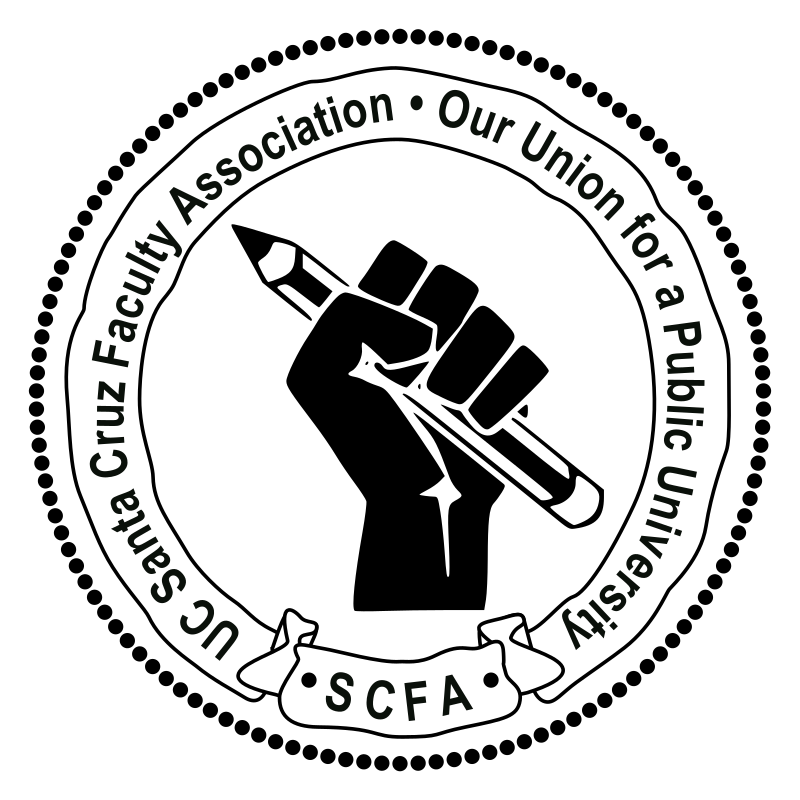This spring the university put out a call for online course proposals, to be developed over the summer with a summer stipend. A condition of the university’s call was that awardees “be willing to share these materials with their colleagues if asked by their colleagues.” The law is clear that faculty retain control of course material they develop, and the SCFA judged that this vague wording provided insufficient protection for faculty intellectual property. After exchanges with the university and university counsel, the award letters issued to awardees were much better on faculty rights, and the university agreed to take our proposals into consideration in future iterations of the program. Our letter to the membership, and to the university are posted below.
————————————————————————-
May 27, 2020
Dear Colleagues,
Yesterday was the due date for applications for Online Course Proposals. This email is addressed to those who submitted applications, and is intended to point out an issue of great concern to those who are accepted to the program. We attach below our signature a copy of an email we sent to Lori Kletzer and Herbie Lee, where we outline our concerns about the following sentence in the call:
“Faculty whose proposals are awarded agree to share their course materials with instructors of future offerings of the course.”
U.S. copyright is very clear about ownership of intellectual property created in the preparation of a course taught in the course of regular employment, and this sentence is in clear violation of copyright law. The SCFA’s position is that those who are accepted into the program contest this clause, which is against your and all of our interests. Serious principles of academic freedom are at stake. For example, if you have signed away your rights to the re-broadcast of your lectures, you will have no control of material being disseminated under your name, whether or not you still hold the positions expressed within. Nor, for example, would you have any say in the matter were your lectures bundled with some others in a course offering, a choice you might not make if you still had the choice. You might also have no choice in the matter should the course be offered by lecturers or graduate students.
We understand that some faculty might have their own reasons for agreeing to that provision, and that is of course your right. The SCFA position is that, especially as online or distance teaching may become more and more common, faculty must zealously guard and protect faculty rights. The above provision represents a preliminary incursion into those rights, and we therefore recommend that you not accept it. Here is a link to an article outlining this issue in the current context: https://www.insidehighered.com/news/2020/05/19/who-owns-all-course-content-youre-putting-online. One of its conclusions is that “conventions can shift”. Laxity in the face of threats to faculty authority over their courses could lead to more serious erosion of rights in the future. We all need to do what we can to prevent that, and this is the reason for this communication. Please contact the SCFA with any concerns.
Sincerely yours,
The SCFA Executive Board
——————————————————————————-
Dear Lori Herbie, and Michael
We write in connection to your email of May 11 calling for online course proposals for Fall 2020. We appreciate that building a body of online courses will allow the university to function more smoothly in uncertain times. Although colleagues on our campus have a range of views on online education policy, we are not writing about this proposal in a broad sense Rather, we are responding to one provision therein:
“Faculty whose proposals are awarded agree to share their course materials with instructors of future offerings of the course.”
As you know, US Copyright law holds that lectures, syllabi, and other nonpatentable work done in the context of a course offering belong to the instructor, not the university. The university affirmed this principle with the SCFA in the bargaining over the Coursera contracts in 2015. The policy outlined in your May 11 email violates the spirit, and possibly also the letter, of copyright provisions, and we urge you to withdraw the proviso or at least make it optional, even if that can only occur after decision to award the $4000 grant has been made. We urge you to reconsider this provision, and to take the time, in consultation with the Senate, to find ways to enable “sharing of material that protect faculty rights and that fall securely within the bounds of copyright law.
We will advise faculty to refuse this provision, and we hope that you grant them the rights that the law provides if they do so.
Sincerely yours,
SCFA Board
